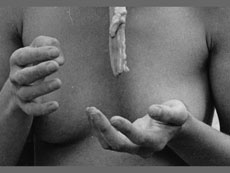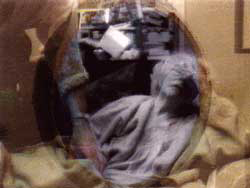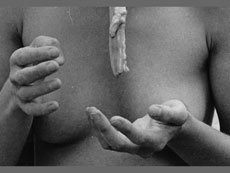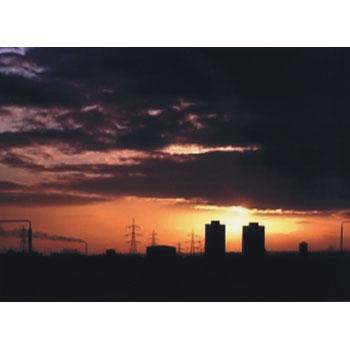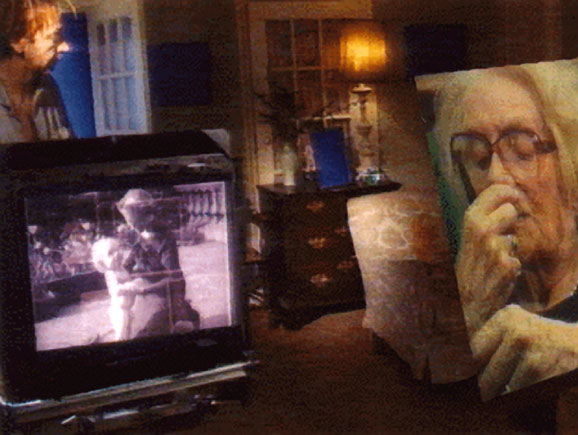Part of Spring 1991
These two programmes represent an eclectic selection of contemporary experimental cinema by filmmakers working in London. When thinking of artists film from the UK, perhaps one usually recalls the structural/materialist work that came out of the Co-op movement in the 60s, or the theoretical text-based films of the 70s and early 80s such as the Mulvey/Wollen collaborations, but the influence of punk, popular culture and television funding from Channel Four and the BBC have had an enormous effect on the variety of media art in the UK. As well, the influence of the Black Workshops production has been tremendous in breaking down the barrier between the so-called political film and the avant-garde; between issue oriented, often community based production and the more formally experimental film which investigates the politics of aesthetics. Many of the filmmakers in these programmes are young and lesser known, such as Ruth Novaczek and Alia Syed. Working independently, they explore issues of racism, cultural and sexual identity.
These two nights of film display the wide range of work currently being produced in Britain. It is a combination of the explorations by younger filmmakers and the ongoing experimentation and innovation by some of Britain’s best known independent filmmakers. Influences range from the gay/punk crossover of the “New Romantic” movement, to structuralist linguistics, Lacanian psychoanalysis and feminism as engaged by Lis Rhodes and David Larcher.
This is an exciting body of work that demonstrates the varied positions that contemporary British filmmakers are working from and the strategies they employ in the political investigation of visual and aural experimentation in film form. (Kathleen Maitland-Carter)
New Historians/Cultural Renegades
Wednesday May 29, 8pm
Working through a history of formal experimentation British film and video artists have reclaimed the notion of the ‘personal’ as a site of political intervention, while remaining fully conscious of issues of representation and cultural concerns; from the Romantic to the semiotic.
Rootless Cosmopolitans Ruth Novaczek, 20 min, 1990.
An experimental documentary which looks at the position of British Jewish women. “Caught between diaspora and Zion, two Jewish princesses explore the drama of the Jewish world, a world of conflict, contradiction and surprises…. Let’s face it, it’s not exactly trendy to be Jewish.”
Degrees of Blindness Cerith Wyn Evans, 18 min, 1988.
The theme of this piece is the relationship of representation to position; the assertion that what we perceive is crucially dependent on what we are. A formally inventive work, which is also a highly critical meditation on the modern city. It displays a technological landscape, through highly technological means, in which it is impossible to get a ‘fix’ on anything, as everything appears free-floating in this shifting and disturbing territory.
The Airwave Spectrum Has Some Defections Alnoor Dewshi, 4 min 1989.
A film by a young and emerging filmmaker that displays an appealingly raw sensibility and a sense of ironic humour towards the misrepresentation in the media of any thing other than ‘pure’ British Culture. “Ten polemic rhymings about authorities and minorities”.
Granny Is David Larcher, 45 min, 1989.
David Larcher has been working in film and video for over 20 years with a series of epic experimental films and a number of film/video works for television. Funded by the British Film Institute, “this is a semiological portrait of his relationship with his grandmother. From Proustian remembrance to post-modern aesthetic fragmentation it is a challenging visual treat.” (Edge 90 Catalogue)
Personalities-Sexualities-Identities
Friday May 31, 8pm
This programme is a selection of recent experimental films by women. These films are expressions of sexuality and identity; investigating subversive positions of identification and desire.
A Cold Draft Lis Rhodes, 28 min, 1988.
The most recent film by one of Britain’s foremost feminist filmmakers, in which, “the acceptance of repression and the danger of repression” are the central themes. Lis Rhodes is also a teacher, writer and co-founder of Circles Women’s Film and Video Distribution Centre.
K Jayne Parker, 12 min, 1989.
Jayne Parker, whose work has lately gained a lot of recognition in Europe, creates eccentric, courageous, and personal films investigating (lesbian) sexuality and power. In this film “the use of a disturbing image of oral disgorgement represents primal desires and a metaphor for the self as inside/outside.” (M. O’Pray)
Moving Through The Mirror Alia Syed, 15 min, 1989.
“[The] film describes a play of misrecognition and idealization between two women who are separated by a mirror…the reflective image, symbol or ideal which is implicated in the forming of subjectivity, self-consciousness and therefore the forming of desire.” (F. O’Donnell, Independent Media)
One and the Other Time Sarah Turner, 5 min, 1990.
A disturbing, intense film that describes the romantic relationship between two women. “An exploration of the dynamics between intimacy and violence, in the context of one’s continual desire to reconcile psychical and external reality; that is, the nearer one gets to that essentiality, the further one is literally pushed away from it.”
Stabat Mater Nina Danino, 8 min, 1990.
This is a lyrical, evocative film shot on location in Gibraltar and making reference to Kristeva. “On one level Stabat Mater is a devotional piece, a short oration. The songs at the beginning and end are the two pillars of the film – it is the voice of my mother singing two laments, a saeta, a type of song sung during holy week to the Mater Dolorosa. It is concerned to locate that which is lost, contained by the body but outside of objectification, absent and unnameable.” Nina Danino is also a writer and co-editor of the film journal Undercut.
Promotion Lisa Hurley, 5 min, 1990.
A provocative and playful film. It is “a literal promotion. Fleeting glimpses of women with cropped hair in black leather darkly intimate the charms of a forbidden [lesbian] culture.” (R. Heather, London Filmmakers Coop Film Festival, 1990)
